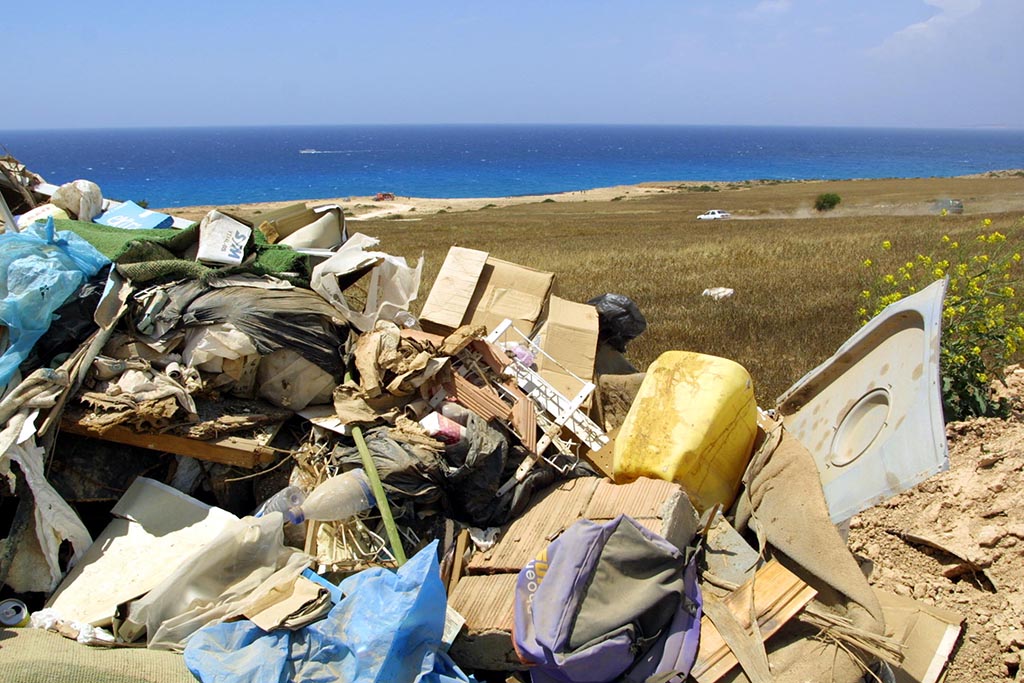The Republic currently faces 16 active EU infringement procedures related to environmental issues
Some 540 illegal rubbish dumps in Paphos, waste dumped in a state forest in Pelendri blocking a fire lane, office furniture from state authorities dumped in a field in Yeri, reported mismanagement of the sustainable development plan for Akamas, and not to mention beaches full of trash with cleanups being initiated regular basis, overwhelmingly by private individuals – Cyprus lags behind in environmental protection, massively.
An audit report filed in early August found a “significant reluctance on the part of the state to adopt drastic and immediate measures” to counter environmental violations. Things do not look good.
And the EU has long taken notice of Cyprus’ environmental shortcomings. According to the register of European Commission’s infringement decisions, the Republic currently faces 16 active infringement procedures related to environmental issues.
“For years the European Commission has identified that in Cyprus there is a systemic abuse of Article 6.3 of the Habitats Directive regarding the environmental appropriate assessment of projects in Cyprus,” BirdLife campaign coordinator Tassos Shialis told the Cyprus Mail.
Shialis explains that the commission, in March 2024, moved the respective infringement case to the European Court of Justice – and called upon Cyprus to take corrective measures to what Shialis describes as “a chronic problem” of approving projects “without adequate and proper environmental assessment”.
“More than a year later, sadly we have not seen significant improvement regarding the correct application of Article 6.3 and the appropriate assessment procedures,” he says.
Shialis represents the BirdLife in the ad-hoc committee, consisting of NGO representatives and experts, which advises the environmental department on the approval of projects.
He says that the lack of improvement was particularly notable when it comes to large scale projects, which he says tends to have bigger negative environmental impacts on Natura 2000 sites and protected species.
In infringement cases, the European Union takes legal action against member states, which fail to comply with EU law.
The five-step process begins with (1) a letter of formal notice, followed by (2) a reasoned opinion if no satisfactory response is received. If the issue remains unresolved, the commission can (3) refer the case to the Court of Justice of the European Union (CJEU), which can (4) impose fines on Cyprus to ensure compliance with EU law. If the court finds that a country has breached EU law, the national authorities are (5) obliged to take action to comply with the ruling of the court.
The infringement case (3 above) Shialis refers to highlights Cyprus’ failure to establish required conservation measures for its special conservation areas.
“Cyprus has formally designated 37 sites as special areas of conservation but has yet to establish the necessary conservation measures for 28 of those sites,” the commission said in March 2024.
Additionally, the commission said that the conservation objectives in place for five sites were inadequate and would not properly protect the local species and habitats.
Cyprus first received a letter of formal notice in June 2021. A reasoned opinion followed in April 2022.
“Despite some progress on the designation of special conservation areas the Cypriot authorities have not fully addressed the grievances, (…) efforts by the Cypriot authorities have, to date, been insufficient,” the commission said in its referral to the CJEU.

‘Significant escalation’
The audit report, issued in early August, focusing on the monitoring of previously brought up environmental issues, equally highlighted the significant and ongoing disregard for EU environmental laws in Cyprus.
According to the report, violations span from urban planning to waste management and the lack of proper protection of habitats. Despite multiple previous audits and legal warnings, the report says that state authorities, particularly the agriculture ministry, have allowed harmful practices to continue, and would often favour private or political interests.
Key cases mentioned in the report include illegal developments in Ayia Thekla and Kouklia, with police investigations stalling in 2020, iIllegal landfills in Vati and Kotsiatis and unauthorised constructions in the Natura 2000 zones of Akamas and illegally operating recycling plants which reportedly pose threats to the environment.
The report notes blatant neglect, such as the Lakatamia environmental centre – yes, an actual evironment centre – being built without an environmental impact study.
The laws exist, violators are known, yet law enforcement seems virtually non-existent.
Who is to be held accountable?
The question of responsibility for Cyprus’ poor environmental protection record is not so easily answered.
Part of the blame undoubtedly lies with the government.
Cyprus has made formal commitments to the UN’s Sustainable Development Goals (SDGs), yet in the latest EU comparison, Cyprus ranks 32nd out of 34 countries, showing notable backsliding in key environmental goals.
While there is a parliamentary committee on the environment and several ad-hoc committees in place, their effectiveness remains limited. The ad-hoc committees, in particular, function only in an advisory role to the environment department, which holds the actual decision-making power.
Then there are local projects, often implemented in cooperation with municipal authorities.
These range from photovoltaic parks and golf courses to campsites placed barely more than 100 metres from protected zones. The procedures for their approval are often complex, with many stakeholders involved including representatives and experts from the environmental department, the toothless tiger ad-hoc committees, private companies and sometimes private individuals who rent out their land for the projects in question.
There is also the lingering question of who is ultimately responsible for addressing daily-life issues such as illegal dumping, beach and sea pollution, or the dismantling of unauthorised constructions like the kiosks in Akamas, which according to the audit report referred to in the first section, remain in place despite authorities having been informed months ago.
The environment department itself, while typically responsive to media requests on questions about their work, has hinted at the tangled web of responsibilities, making it hard get a hold of people to provide further insight into projects and their potential environmental impact.
“According to the law, local authorities are responsible for the cleaning and illegal dumping of waste,” environment department director Theodoulos Mesimeris told the Cyprus Mail.
He explained that in the case of illegal dumping, a recurring issue on the island with reports about newly discovered illegal rubbish sites being published almost daily, his department supports the municipalities in the cleaning of illegal waste.
“We circulate all the information we have, based on satellite data, and provide economic support, depending on the size and location of the site. We have a mechanism to evaluate the cost, and we work with local authorities to manage the cleanup,” he says.
However, the department does not fully cover the costs. While some parts may be covered, additional financial support is provided to the local communities by the interior ministry.
This fragmented, overlapping structure of responsibilities across government departments, local municipalities, and regulatory bodies paints a picture of a country grappling with environmental protection.
The answer of who is responsible remains somewhat scattered, just as the waste that continues to pile up across the island.






Click here to change your cookie preferences